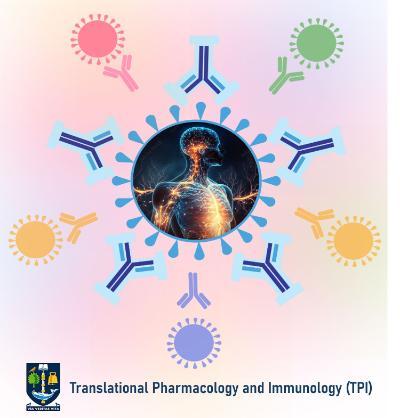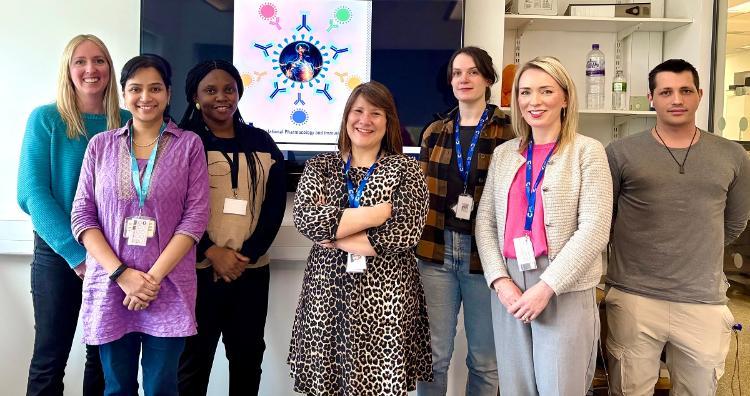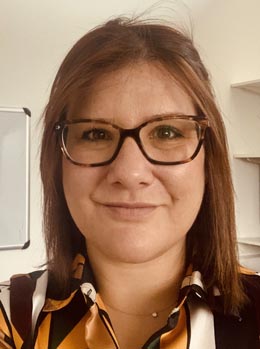Professor Maria Ascierto
- Professor of Translational Cancer Immunology (Translational Pharmacology Lab)
Biography
Complete List of Published Work in My Bibliography:
https://www.ncbi.nlm.nih.gov/myncbi/maria%20libera.ascierto.2/bibliography/public/
Most relevant papers:
- Patel S, Alonso-Gordoa T, Banerjee S, Wang D, Naidoo J, Standifer N, Palmer D, Cheng L, Kourtesis P, Ascierto M, Das M, Diamond J, Hellmann M, Carneiro B. Phase 1/2 study of monalizumab plus durvalumab in patients with advanced solid tumors. Journal for ImmunoTherapy of Cancer. 2024 February; 12(2):e007340-. doi: 10.1136/jitc-2023-007340.
- In G, Ribeiro J, Yin J, Xiu J, Bustos M, Ito F, Chow F, Zada G, Hwang L, Salama A, Park S, Moser J, Darabi S, Domingo[1]Musibay E, Ascierto M, Margolin K, Lutzky J, Gibney G, Atkins M, Izar B, Hoon D, VanderWalde A. Multi-omic profiling reveals discrepant immunogenic properties and a unique tumor microenvironment among melanoma brain metastases. npj Precision Oncology. 2023 November 14; 7(1):-. Available from: https://www.nature.com/articles/s41698-023-00471-z DOI: 10.1038/s41698-023-00471-z b.
- Pore N, Wu S, Standifer N, Jure-Kunkel M, de los Reyes M, Shrestha Y, Halpin R, Rothstein R, Mulgrew K, Blackmore S, Martin P, Meekin J, Griffin M, Bisha I, Proia T, Miragaia R, Herbst R, Gupta A, Abdullah S, Raja R, Frigault M, Barrett J, Dennis P, Ascierto M, Oberst M. Resistance to Durvalumab and Durvalumab plus Tremelimumab Is Associated with Functional STK11 Mutations in Patients with Non–Small Cell Lung Cancer and Is Reversed by STAT3 Knockdown. Cancer Discovery. 2021 November 01; 11(11):2828-2845. Available from: https://aacrjournals.org/cancerdiscovery/article/11/11/2828/666407/Resistance-to-Durvalumab-and-Durvalumab-plus DOI: 10.1158/2159-8290.CD-20-1543 c.
- Ascierto M, Makohon-Moore A, Lipson E, Taube J, McMiller T, Berger A, Fan J, Kaunitz G, Cottrell T, Kohutek Z, Favorov A, Makarov V, Riaz N, Chan T, Cope L, Hruban R, Pardoll D, Taylor B, Solit D, Iacobuzio-Donahue C, Topalian S. Transcriptional Mechanisms of Resistance to Anti–PD-1 Therapy. Clinical Cancer Research. 2017 June 15; 23(12):3168-3180. Available from: https://aacrjournals.org/clincancerres/article/23/12/3168/79926/Transcriptional-Mechanisms-of-Resistance[1]to-Anti DOI: 10.1158/1078-0432.CCR-17-0270 d. Ascierto M, McMiller T, Berger A, Danilova L, Anders R, Netto G, Xu H, Pritchard T, Fan J, Cheadle C, Cope L, Drake C, Pardoll D, Taube J, Topalian S. The Intratumoral Balance between Metabolic and Immunologic Gene Expression Is Associated with Anti–PD-1 Response in Patients with Renal Cell Carcinoma. Cancer Immunology Research. 2016 September 02; 4(9):726-733. Available from: https://aacrjournals.org/cancerimmunolres/article/4/9/726/468576/The-Intratumoral-Balance[1]between-Metabolic-and DOI: 10.1158/2326-6066.CIR-16-0072 e.
- Ascierto M, McMiller T, Berger A, Danilova L, Anders R, Netto G, Xu H, Pritchard T, Fan J, Cheadle C, Cope L, Drake C, Pardoll D, Taube J, Topalian S. The Intratumoral Balance between Metabolic and Immunologic Gene Expression Is Associated with Anti–PD-1 Response in Patients with Renal Cell Carcinoma. Cancer Immunology Research. 2016 September 02; 4(9):726-733. Available from: https://aacrjournals.org/cancerimmunolres/article/4/9/726/468576/The-Intratumoral-Balance[1]between-Metabolic-and DOI: 10.1158/2326-6066.CIR-16-0072
Research interests

The Translational Pharmacology and Immunology (TPI) laboratory at the School of Cancer Sciences of University of Glasgow is the heart of translational research and clinical biomarker discovery at UofG.
It encompasses clinical trials, biospecimens, and biomedical informatics programs. The objective of the Translational Pharmacology and Immunology (TPI) program is to foster Biomarker Discovery by using Precision Immunology.
Specifically, TPI unleashes a combination of cutting - edge proteomic approaches (e.g. spatial immune profile, spectral cytometry and ultrasensitive analytical measurement of chemokines and cytokines), performed according to GCLP standards to: (i) discover patterns of immune evasion responsible for resistance to immunotherapy and additional therapeutic interventions; (ii) foster the development of novel immunotherapeutic treatments.
The lab focuses on melanoma and GI cancers which serve as models of immunotherapy sensitive and resistant cancer types.

Research groups
- Melanoma
- Immunology
- Breast
- Colorectal/Lower GI/intestinal/gut microbiome
- Liver


